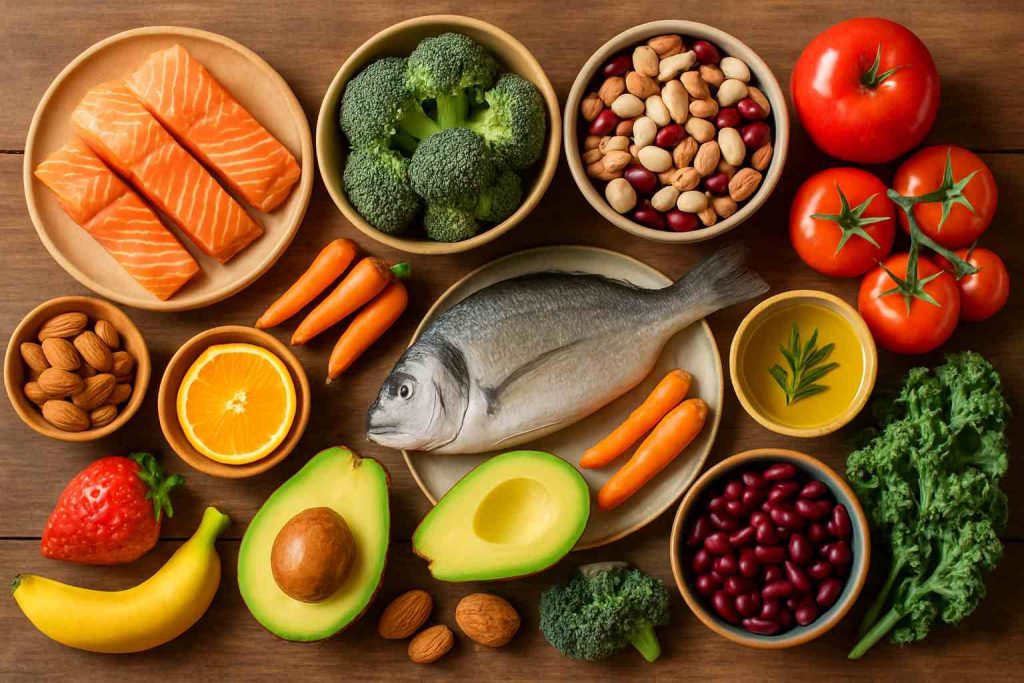A heart healthy diet plan can dramatically reduce your risk of heart disease—starting today. The best way to prevent heart problems is by eating a balanced, nutrient-rich diet based on the latest nutrition science and expert guidelines. Understanding what to eat (and what to limit) is crucial for managing blood pressure, cholesterol, and maintaining a healthy weight. This article offers actionable tips and a detailed, dietitian-approved 5-day meal plan designed to keep your heart strong and healthy. You’ll discover essential foods, proven meal strategies, and easy-to-follow daily menus. For official recommendations, always refer to the American Heart Association’s Diet and Lifestyle page.

What Is a Heart Healthy Diet Plan?
A heart healthy diet plan focuses on whole, unprocessed foods—especially vegetables, fruits, whole grains, lean proteins, nuts, seeds, and healthy fats. The primary goal is to lower cholesterol, reduce blood pressure, and control weight. Here are the key features:
- Plenty of vegetables and fruits: At least 4–5 servings of each per day.
- Whole grains: Choose oats, quinoa, brown rice, or whole-wheat bread/pasta.
- Lean proteins: Fish (especially fatty types like salmon and sardines), poultry, tofu, beans, and low-fat dairy.
- Healthy fats: Emphasize olive oil, canola oil, nuts, seeds, and avocado.
- Limited saturated and trans fats: Minimize red/processed meats, butter, fried and processed foods.
- Low sodium and added sugar: Keep daily sodium below 1,500–2,300 mg and avoid sugary drinks/snacks.
According to the American Heart Association, these patterns are proven to lower your risk of cardiovascular disease, stroke, and high blood pressure (2025).
Benefits of a Heart Healthy Diet (with Latest Research)
- Lowers cholesterol and blood pressure: Diets like DASH and Mediterranean can reduce blood pressure by 6–11 mm Hg and lower LDL cholesterol significantly.
- Reduces heart disease and stroke risk: Studies show up to a 30% lower risk of cardiovascular events with heart-healthy diets (Harvard T.H. Chan School of Public Health, 2025).
- Helps control weight: High fiber and nutrient density keep you fuller, longer.
- Supports overall well-being: Linked to lower rates of diabetes, certain cancers, and cognitive decline.
Key Heart Healthy Foods to Include
Vegetables and Fruits
- Aim for a rainbow of colors daily. Great choices: spinach, broccoli, tomatoes, berries, oranges, apples, and carrots.
Whole Grains
- Oats, quinoa, brown rice, barley, and whole-wheat bread/pasta.
- Oatmeal is especially beneficial for lowering cholesterol (EatingWell, 2025).
Lean Proteins
- Fish: Salmon, sardines, trout (rich in omega-3 fatty acids).
- Plant-based: Beans, lentils, tofu, tempeh.
- Low-fat dairy: Skim milk, Greek yogurt, cottage cheese.
Healthy Fats
- Avocados, nuts (almonds, walnuts), seeds (chia, flaxseed), and olive oil.
- Chia seeds: 2½ tablespoons per day can lower LDL and triglycerides (EatingWell, 2025).
Foods to Avoid or Limit
- Processed meats, fried foods, excess red meat, butter, full-fat dairy, sugary snacks/drinks, and high-sodium packaged foods.
5-Day Heart Healthy Meal Plan (Dietitian-Approved)
Each day: ~1,600–1,800 calories, 30–40g fiber, ≤1,500mg sodium, and ≤14g saturated fat.
Day 1
- Breakfast: Oatmeal with blueberries, chia seeds, and a drizzle of honey
- Snack: Greek yogurt with walnuts
- Lunch: Grilled salmon over quinoa and spinach salad, cherry tomatoes, vinaigrette
- Snack: Apple slices with almond butter
- Dinner: Stir-fried tofu with broccoli, bell peppers, and brown rice
Day 2
- Breakfast: Whole-grain toast, avocado, poached egg, and sliced tomato
- Snack: Baby carrots with hummus
- Lunch: Lentil soup, mixed greens salad with olive oil and lemon
- Snack: Orange or clementine
- Dinner: Baked chicken breast, roasted sweet potato, and steamed green beans
Day 3
- Breakfast: Greek yogurt parfait with strawberries and sunflower seeds
- Snack: Banana
- Lunch: Tuna salad (olive oil-based) on whole-grain wrap with lettuce and cucumbers
- Snack: Small handful of unsalted almonds
- Dinner: Sautéed shrimp with quinoa and spinach, served with steamed asparagus
Day 4
- Breakfast: Smoothie (spinach, banana, mixed berries, flaxseed, and almond milk)
- Snack: Celery sticks with peanut butter
- Lunch: Chickpea and vegetable stir-fry over brown rice
- Snack: Low-fat cottage cheese with pineapple
- Dinner: Grilled turkey breast, roasted Brussels sprouts, and quinoa pilaf
Day 5
- Breakfast: Overnight oats with apples, cinnamon, and walnuts
- Snack: Red bell pepper strips with tzatziki
- Lunch: Baked cod, farro salad with cherry tomatoes, cucumber, and parsley
- Snack: Sliced pear with low-fat cheese
- Dinner: Veggie chili (beans, tomatoes, peppers, corn) with a side salad
Water, herbal teas, and black coffee (if desired) are encouraged throughout the day.
10 Quick Tips for a Heart Healthy Diet Plan
- Fill half your plate with vegetables and fruits at every meal.
- Choose whole grains instead of refined.
- Eat fatty fish 2–3 times per week.
- Use olive oil or avocado oil for cooking.
- Snack on unsalted nuts or fruit.
- Limit sodium by reading labels—choose <140mg per serving.
- Avoid sugar-sweetened beverages—drink water or herbal tea.
- Meal prep to avoid last-minute unhealthy choices.
- Choose lean proteins and plant-based options.
- Season food with herbs and spices instead of salt.
For more guidance, see the AHA’s Meal Planning Essentials.
Frequently Asked Questions
How much sodium is safe per day for heart health?
Experts recommend 1,500–2,300mg sodium per day for most adults (AHA, 2025).
Is coffee allowed on a heart healthy diet?
Yes, in moderation. Up to 3–5 cups per day is generally safe for most adults unless your doctor advises otherwise (AHA, 2025).
Are there foods I should never eat?
Completely avoiding processed meats, trans fats, and excessive added sugars is best for heart health.
What about supplements?
Focus on whole foods first; supplements are not a substitute for a heart-healthy diet unless prescribed by your physician.
Conclusion
A heart healthy diet plan isn’t complicated—it’s all about simple, balanced choices and consistency. Start with these tips and the 5-day meal plan to reduce your risk of heart disease and feel your best. For more expert advice, consult a registered dietitian or visit the American Heart Association’s website.
